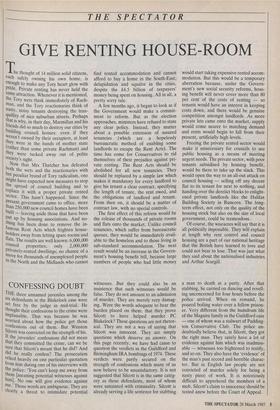CONFESSING DOUBT
THE three unnamed juveniles among the six defendants in the Blakelock case were set free by the judge in mid-trial. He thought their confessions to the crime were implausible. That was because he was worried about how the police got those Confessions out of them. But Winston Slicott was convicted on the strength of his. If the juveniles' confessions did not mean that they committed the crime, can we be sure that Silcott's meant that he did? And did he really confess? The prosecution relied heavily on one particular quotation from him during one of his interviews with the police: 'You can't keep me away from them [meaning potential witnesses against him]. No one will give evidence against me. Those words are ambiguous. They are clearly a threat to intimidate potential witnesses. But they could also be an insistence that such witnesses would be false. They do not amount to an admission of murder. They are merely very damag- ing. Were the words adequate to bear the burden placed on them: that they prove Silcott to have helped murder PC Blakelock? These questions are not rhetor- ical. They are not a way of saying that Silcott was innocent. They are simply questions which deserve an answer. On this page recently, we have had cause to question the verdicts in the Guildford and Birmingham IRA bombings of 1974. These verdicts were partly secured on the strength of confessions which many of us now believe to be unsatisfactory. It is not suggested that Silcott is in the same categ- ory as those defendants, most of whom were untainted with criminality. Silcott is already serving a life sentence for stabbing a man to death at a party. After that stabbing, he carried on dancing and revell- ing unconcerned for four hours before the police arrived. When on remand, he poured boiling water over a fellow prison- er. Very different from the humdrum life of the Maguire family in the Guildford case — one of whom was a stalwart of Padding- ton Conservative Club. The police un- doubtedly believe that, in Silcott, they got the right man. They surely have a lot of evidence against him which was inadmiss- able — witnesses too frightened to testify, and so on. They also have the 'evidence' of the man's past record and horrible charac- ter. But in English law people are not convicted of murder solely for being a nasty piece of work. It is notoriously difficult to apprehend the members of a mob. Silcott's claim to innocence should be tested anew before the Court of Appeal.


















































 Previous page
Previous page